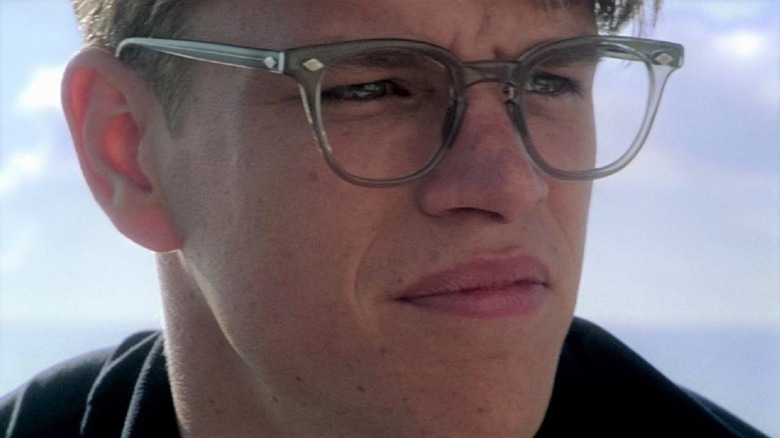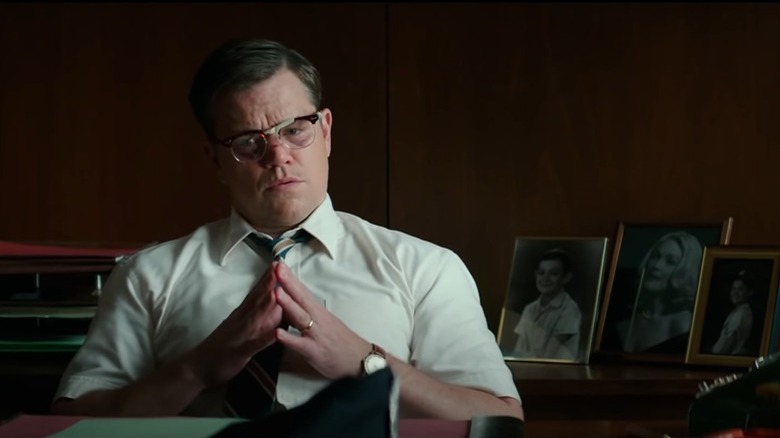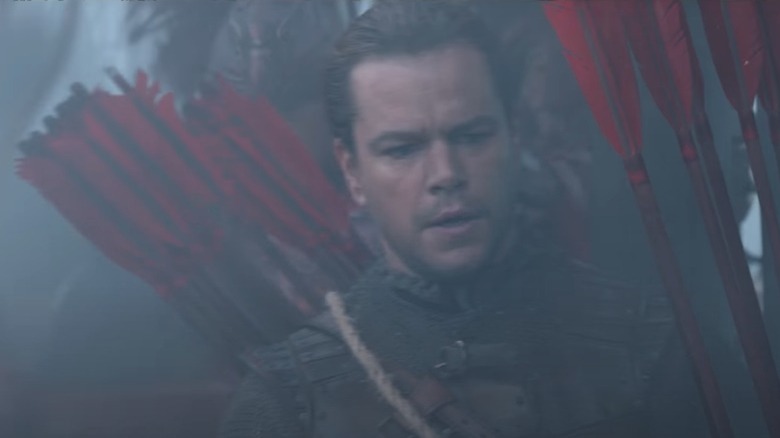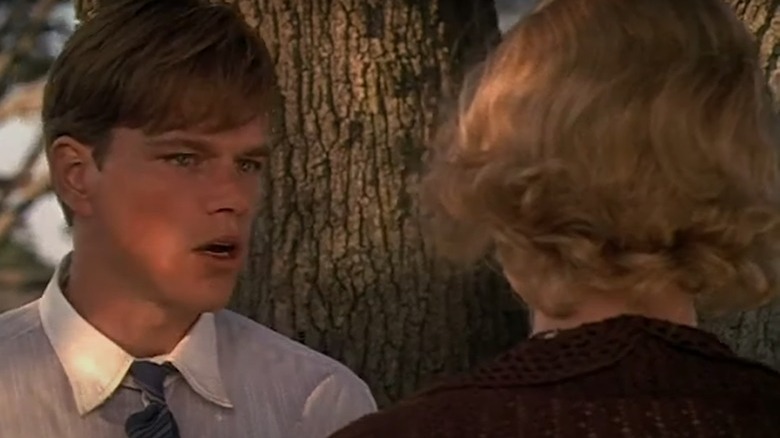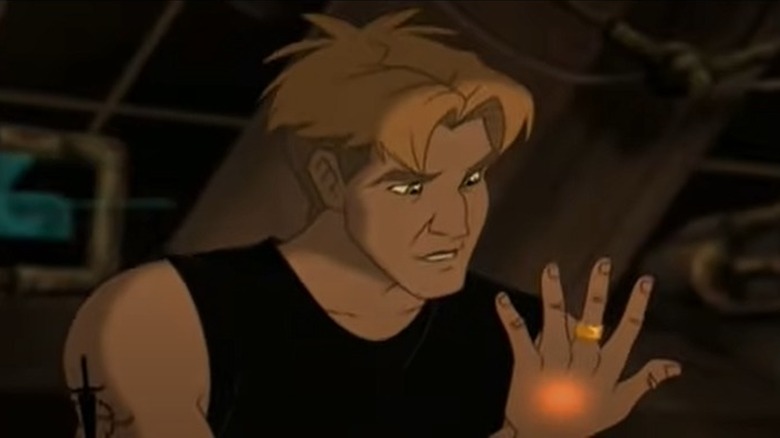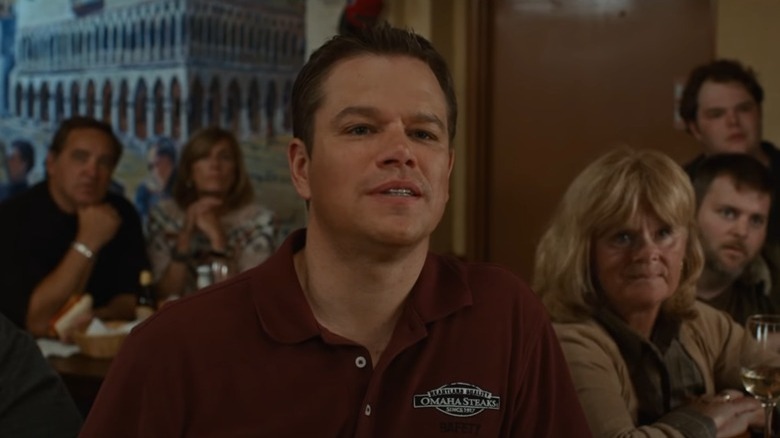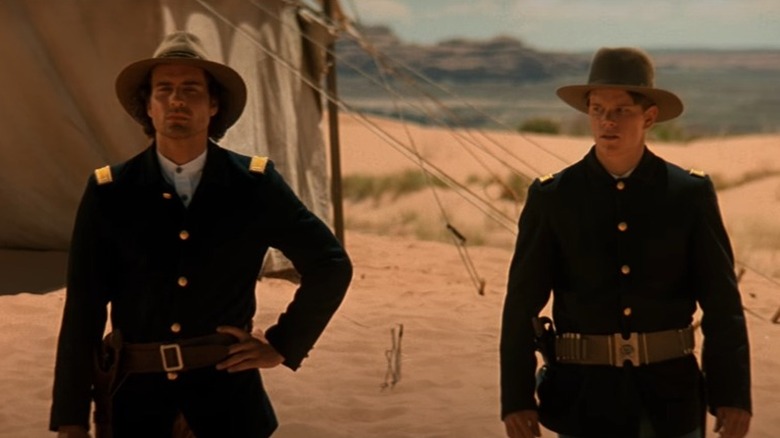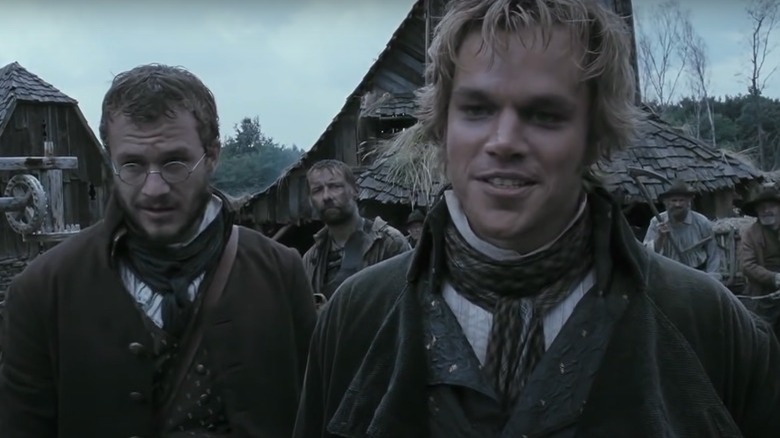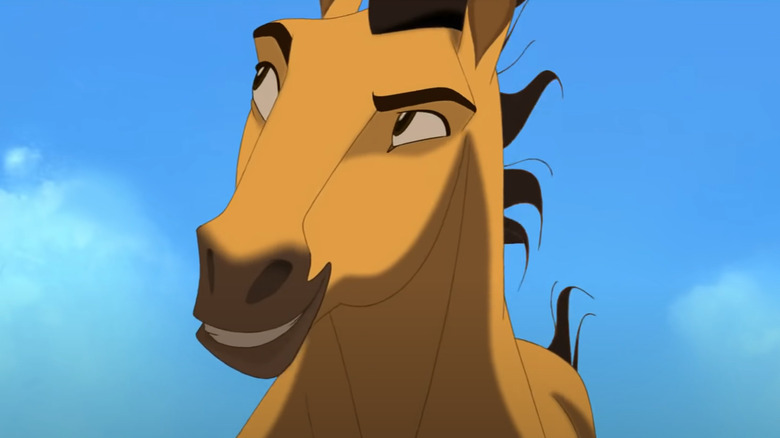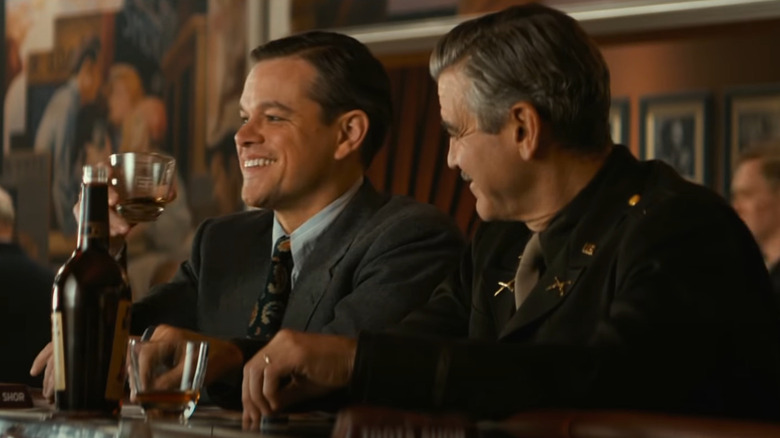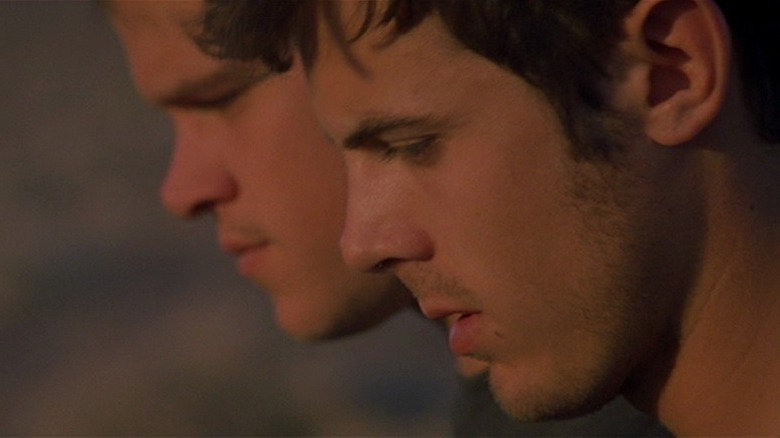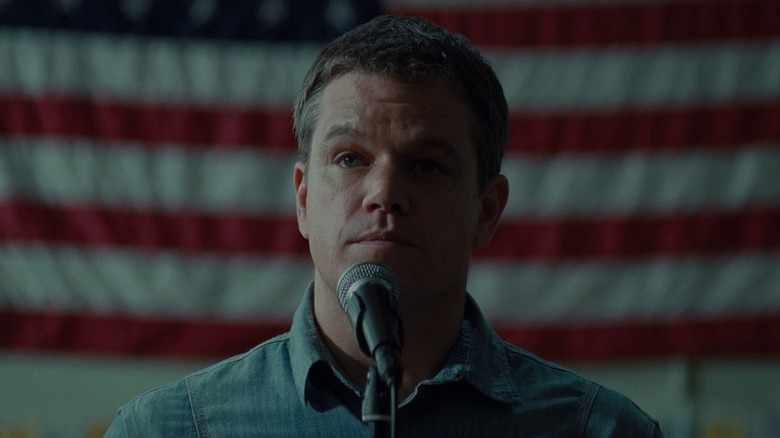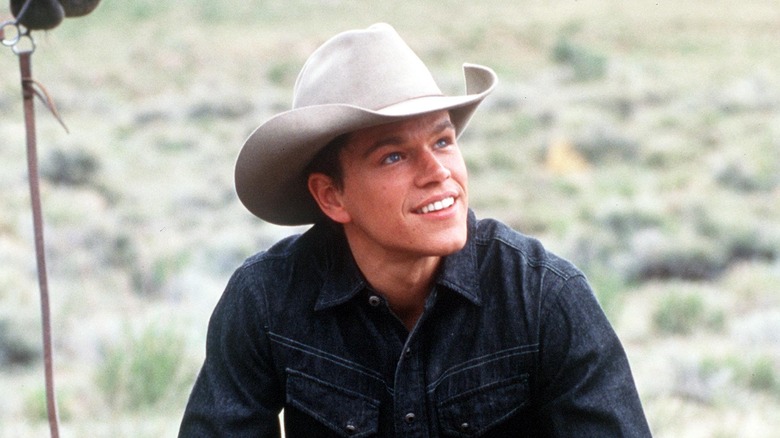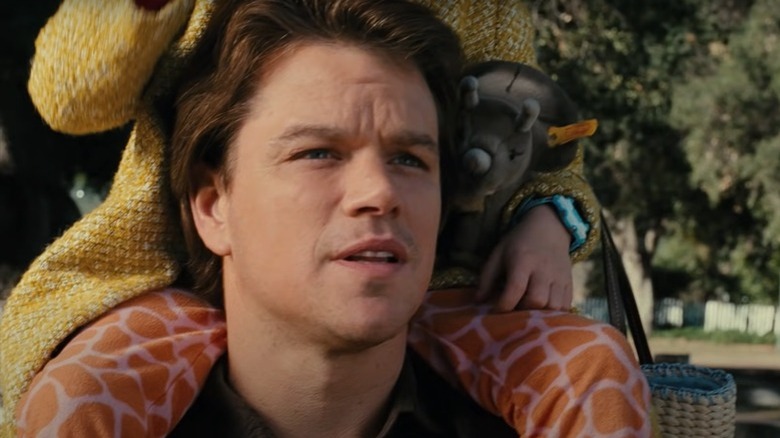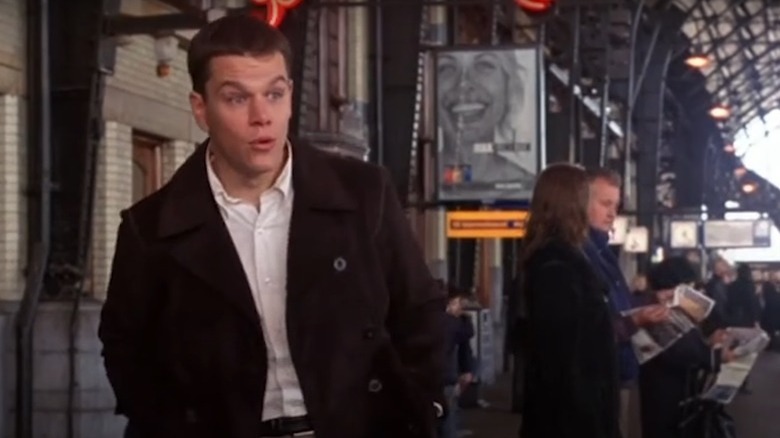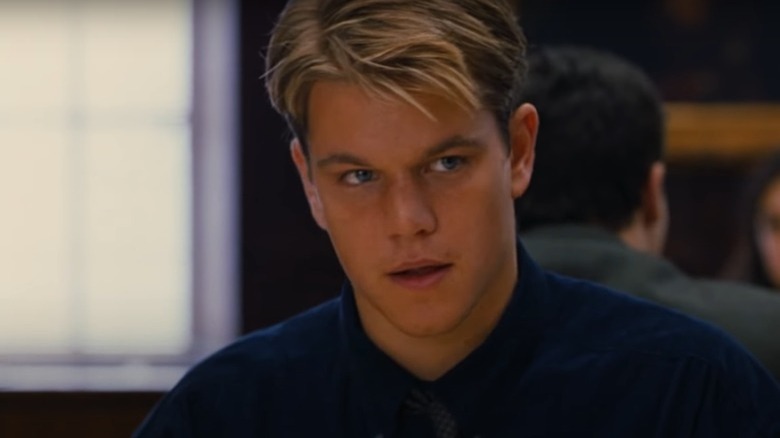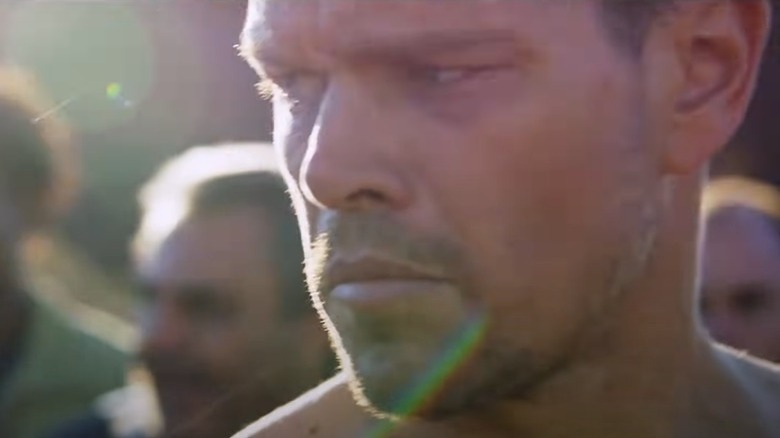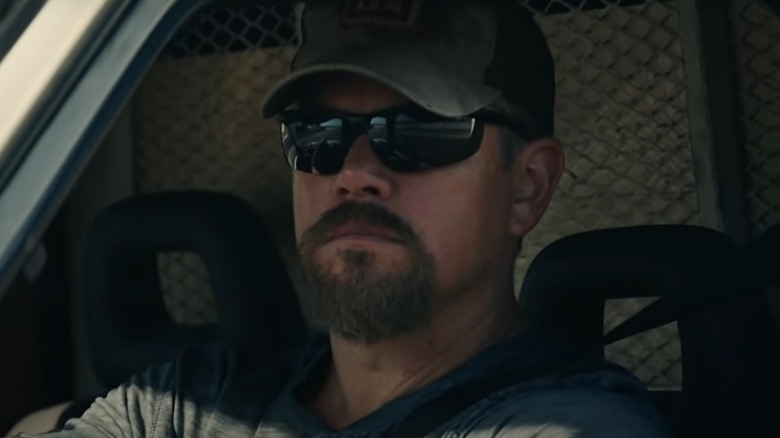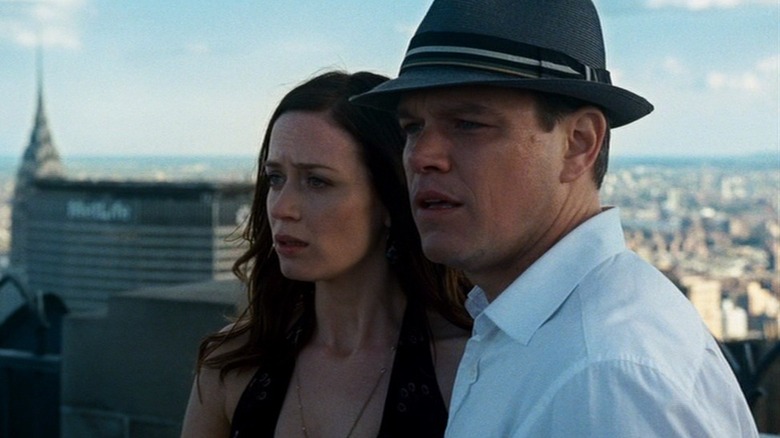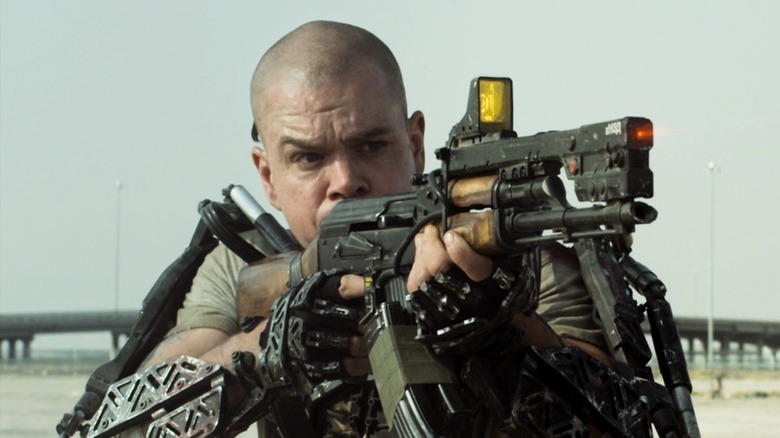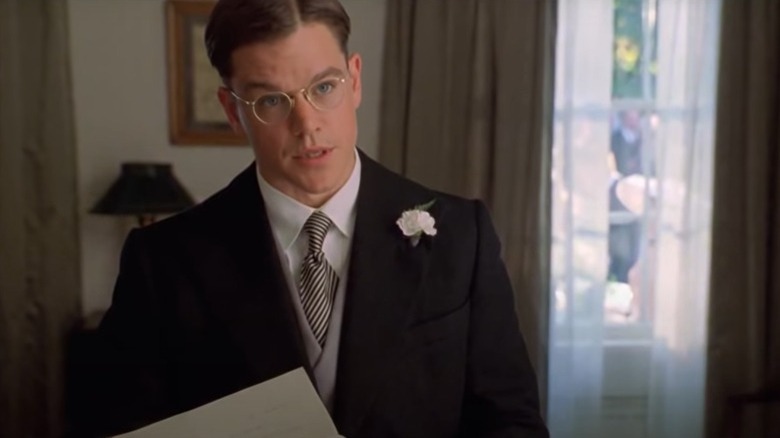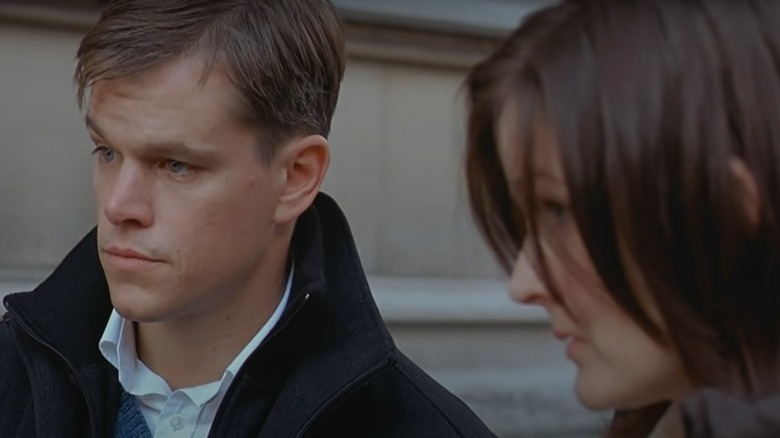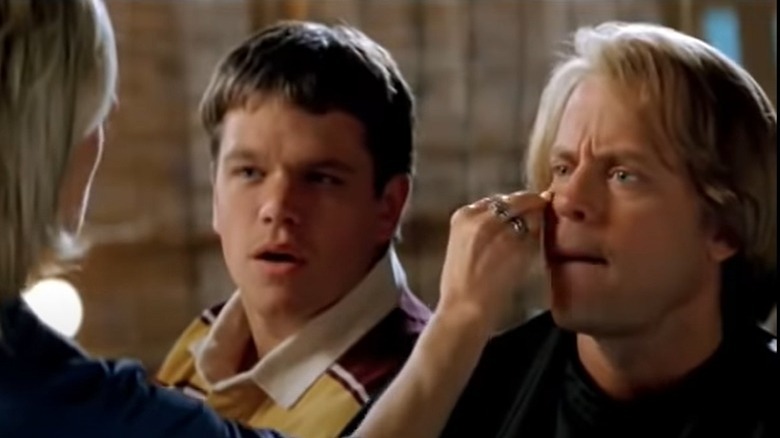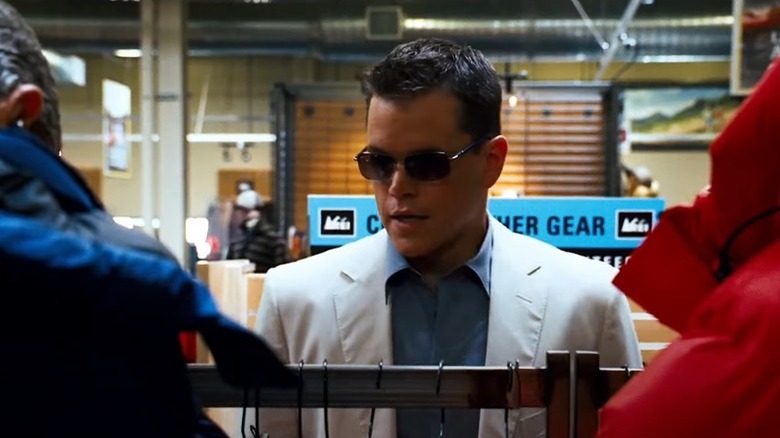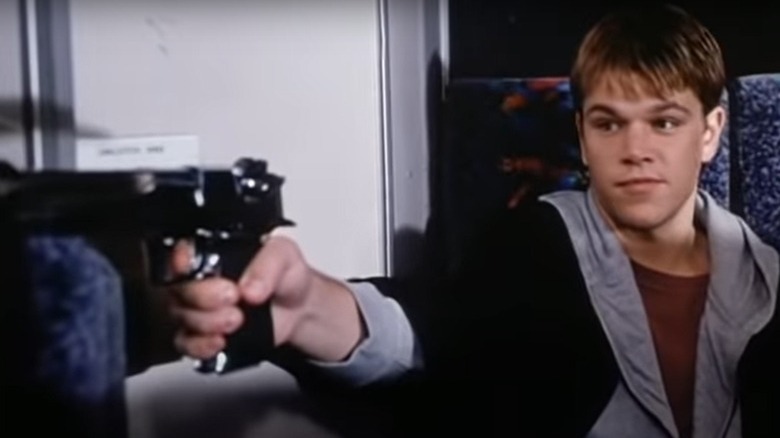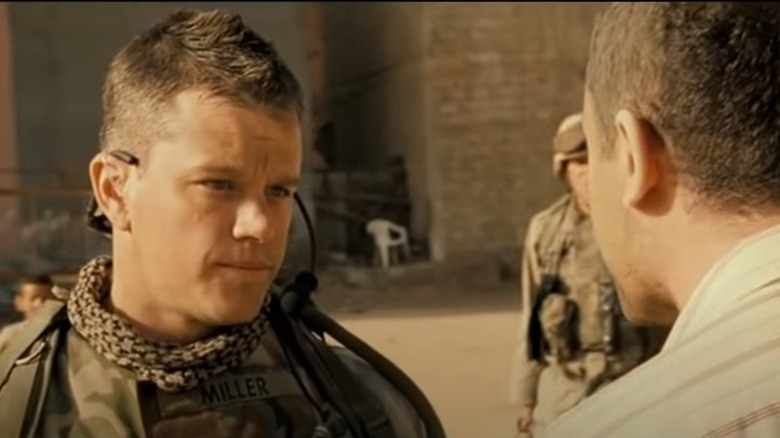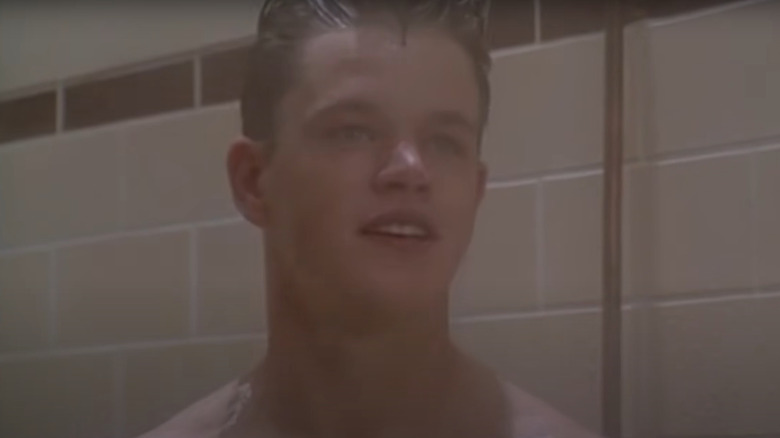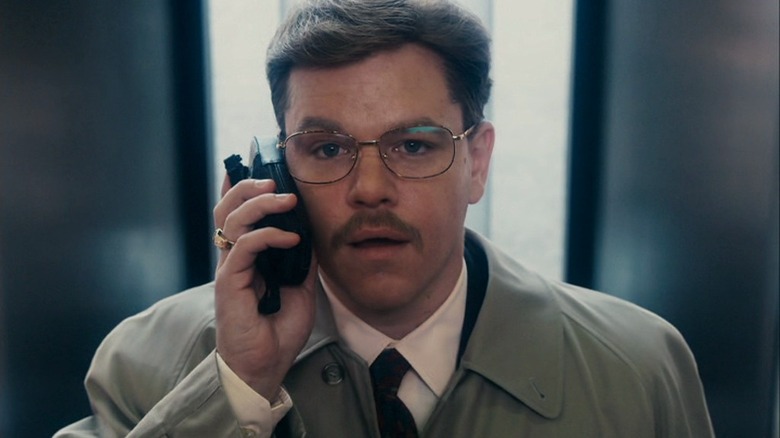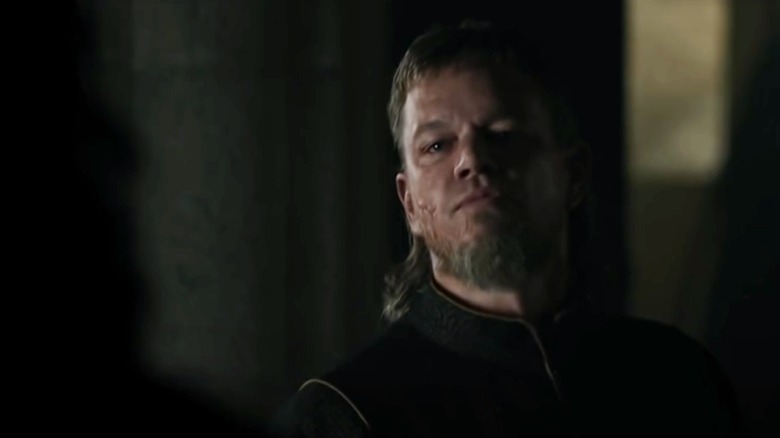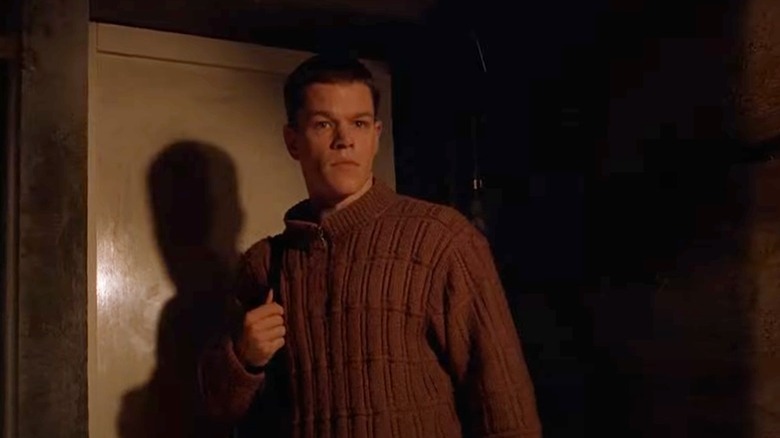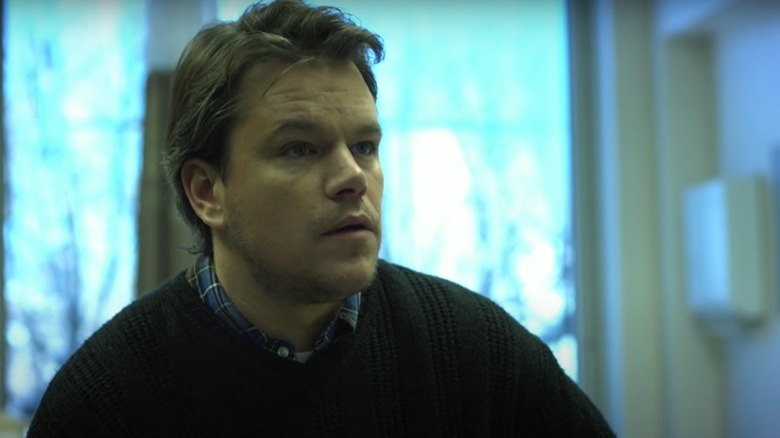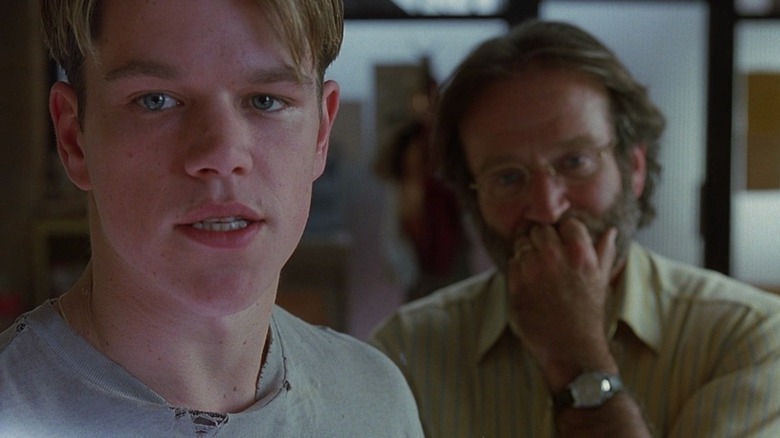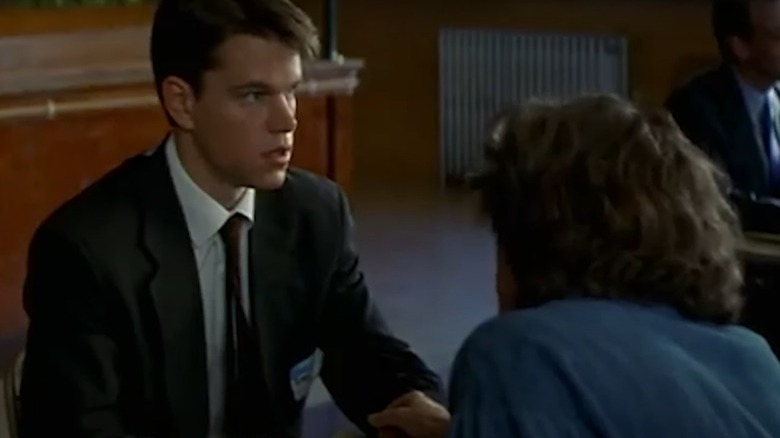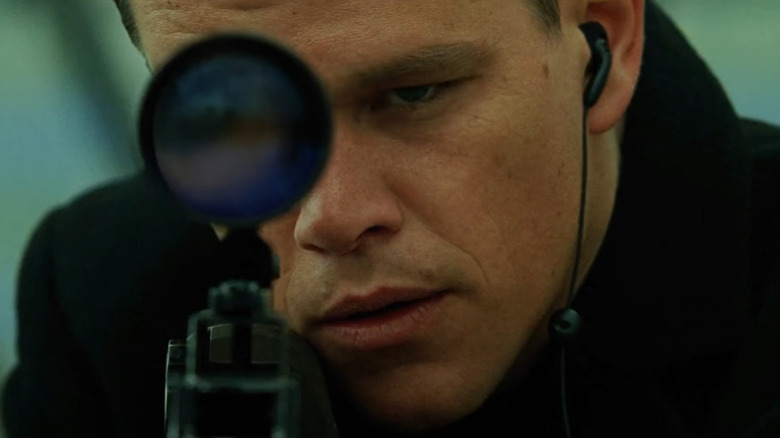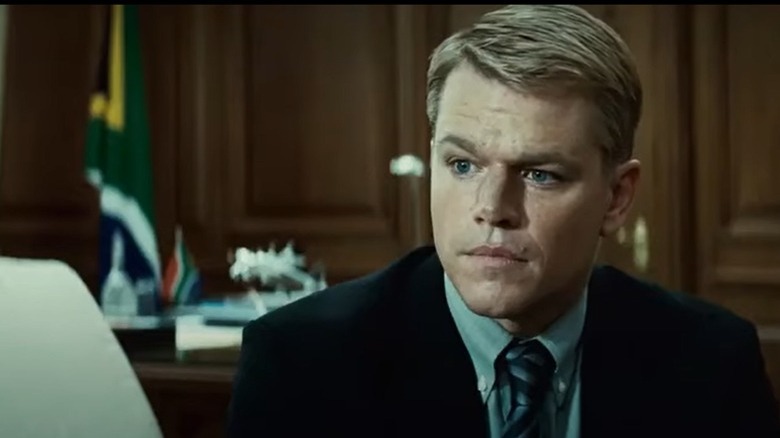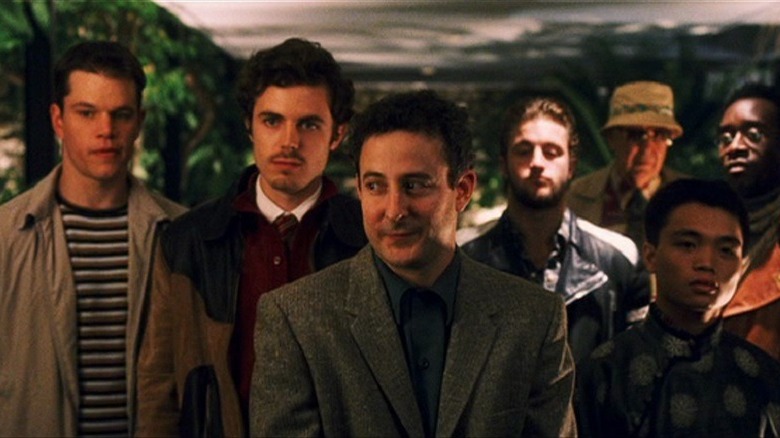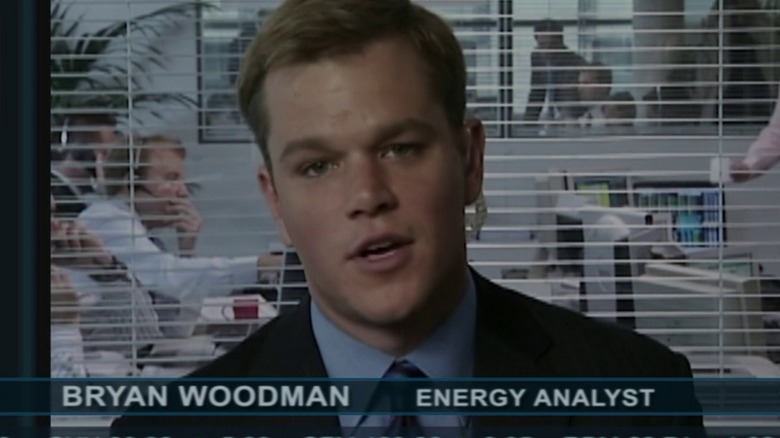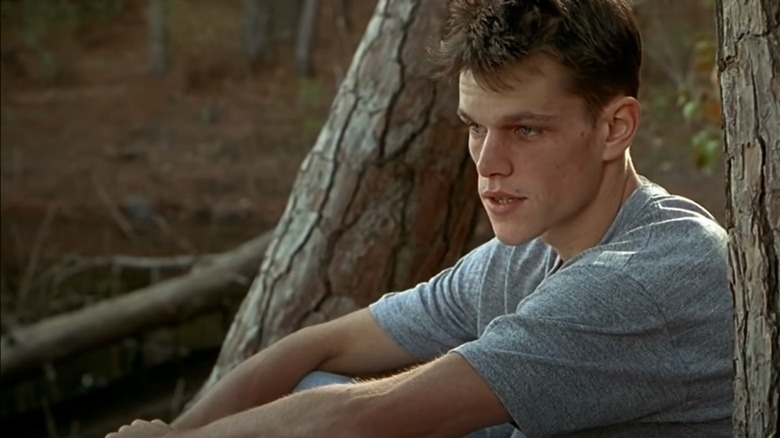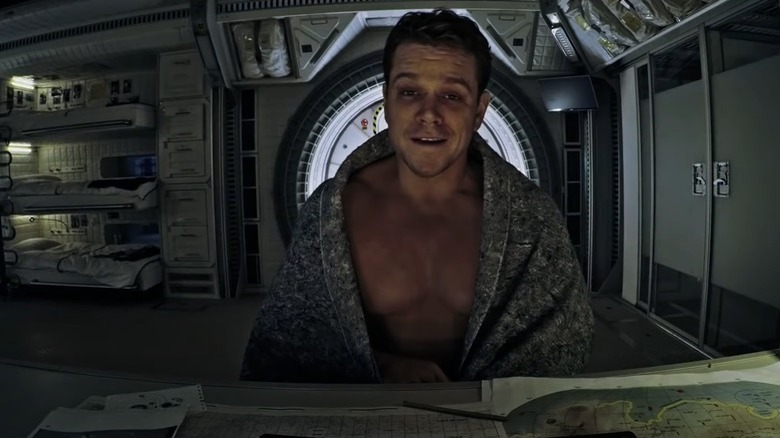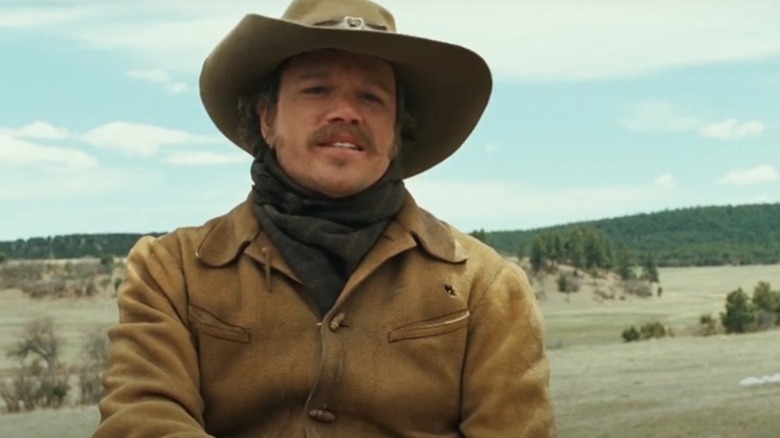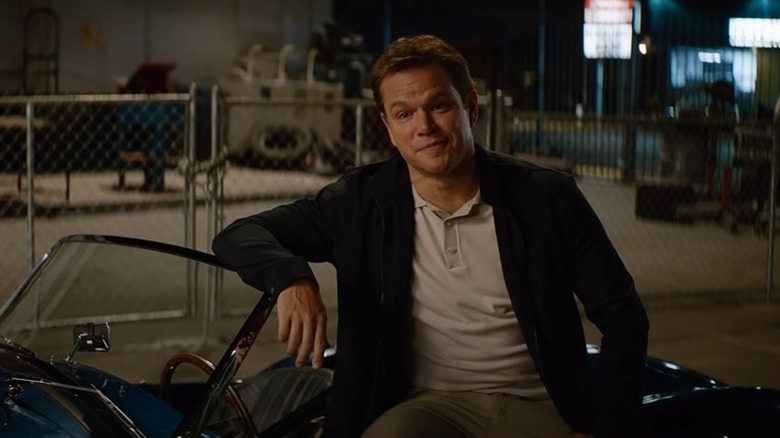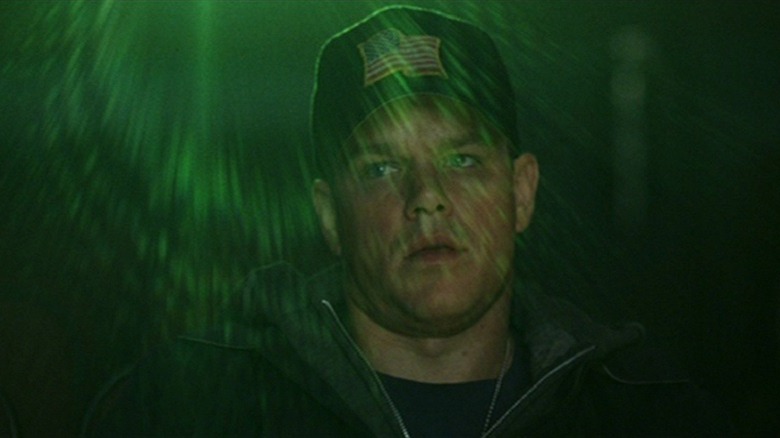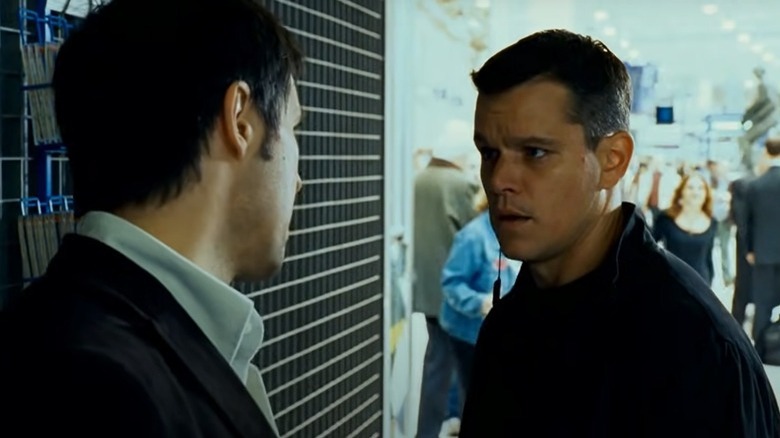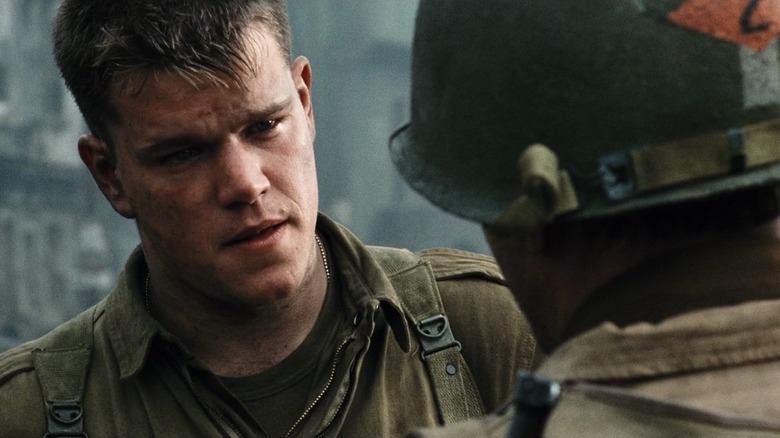Every Matt Damon Movie Ranked Worst To Best
For decades now, Matt Damon has been a part of the cinematic landscape. In addition to acting, Damon has written, produced, and helped develop projects for himself and others. The man's even won an Oscar for screenwriting, courtesy of "Good Will Hunting."
His acting toolkit allows him to move from action to drama to comedy with equal ease. He can break your heart in "Courage Under Fire," leave you holding your sides with laughter in "Stuck on You," and chill your blood with his work on "The Talented Mr. Ripley." Even in films that aren't particularly well-regarded, Damon can usually be counted on to still bring his A-game.
With a filmography as varied and impressive as his, it can be hard to know where to start if a viewer wants to do deep dive into his work. That's where this list comes in. Beginning with the worst and going through to the absolute best, we're about to rank the films in which Matt Damon features prominently or made a big impact in a small role. (However, we won't be including films where Damon is just making a cameo appearance — sorry, "Thor: Ragnarok.")
Suburbicon
On paper, everything about "Suburbicon" screamed promising. It began with an old script from the Coen Brothers that George Clooney reworked and eventually directed. The story is set in '50s America, a time and place that both the writer-director-producer siblings and Clooney himself had experienced great critical success in portraying via films like "The Man Who Wasn't There" and "Good Night, and Good Luck," respectively. That resume certainly proved successful in luring in a strong cast, including the likes of Damon and Julianne Moore. Top-class behind-the-scenes talent also was drawn to the work, most prominently Robert Elswit, the cinematographer behind several Paul Thomas Anderson films.
Alas, all the promise crash-landed hard upon the release of "Suburbicon." As indicated by Rotten Tomatoes' survey of all the film's reviews, the film failed at trying to do too much, including plotlines that involving multiple crimes, commentary on the state of white flight and Black success in the suburbs in the 1950s, and social satire of the post-war middle-class boom. The box office was similarly unkind to "Suburbicon," with the film only making back about half of its production budget.
The Great Wall
Before "The Great Wall" even hit theaters, the film had already begun to face charges of whitewashing and white saviorism. Damon, for his part, denied any such thing, insisting that the intention from the start had been for his role to be a Western white man. Therefore, he didn't "steal" a role from an Asian or Asian-American actor. Damon played an Irish mercenary soldier alongside American actors like Willem Dafoe and Pedro Pascal. Most of the cast, however, was comprised of Chinese actors.
Upon its release, the debate did not cease. Some publications, like The Huffington Post, rejected claims of whitewashing while admitting white saviorism was harder to dismiss. Others felt the final product confirmed their initial impressions. Others still, like IndieWire, decided the debate wasn't even worth having, considering how bad the movie was in and of itself.
However, while the film cratered hard at the box office domestically, it did very well internationally. "Great Wall" made only a third of its budget back in the United States, but the film took in nearly $290 million overseas. When all was said and done, "Great Wall" overcame its negative buzz and a disinterested domestic audience to make more than $180 million more than its production budget.
The Legend of Bagger Vance
Upon release, critics and Spike Lee singled out this story of golf as salvation for using the racially insensitive "Magical Negro" trope. However, even reviews that praised Will Smith's performance seemed to indicate it was in spite of the character he had to play, not because of it.
While critics didn't have much negative to say about Damon's performance as the improbably named Rannulph Junuh — the young golfer assisted by Smith's Bagger Vance – they tended to be more dismissive than praising. He's not bad, so much as the film does little to sell either the source of his trauma or why his current activities are such an indication of moral degradation.
While poorly attended upon its release, viewers these days tend to be friendly to the film. According to Metacritic, the public likes the movie nearly twice as much as the critical community. Nonetheless, judging the 2000 weeper against its peers puts "The Legend of Bagger Vance" among the lowest-rated films of Damon's career.
Titan A.E.
In several ways, "Titan A.E." was a landmark film. Initially intended as a live-action film, it failed to come to fruition. The script then found its way to Fox Animation, where it would become the third offering from the studio and the second under animation legend Don Bluth's leadership following the impressive hit "Anastasia." Unfortunately, it would be the studio's last offering as well.
As "Titan A.E." winded its way through production, the filmmakers vacillated between animation approaches. Originally, they considered the traditional hand-drawn look of "Anastasia" and Disney productions of the time. Then, they leaped towards going all out with 3-D animation. Finally, they settled on what was a groundbreaking for the time mix of hand-drawn and computer rendered visual.
Unfortunately, its visual appeal didn't translate into critical or box office appreciation. With a Metacritic score of 48 and a box office total of under $37 million against a $75 million budget, critics largely concluded it was a collection of tired tropes wrapped in a pretty bow.
Downsizing
In the near future, the solution to the environmental mismanagement of our planet has been discovered. Rather than moving to solar energy, more recycling, or the regulation of corporations, it turns out it's a brand-new technology that shrinks volunteers to live in a tiny replica of our world. The idea strikes Paul Safranek's (Damon) fancy, so he and his wife, Audrey (Kristen Wiig), sign up. But in the end, it turns out she doesn't share Paul's enthusiasm. Audrey opts to divorce him and stay full-sized while microscopic Paul adapts to a new size and a new life alone.
"Downsizing" proved a rare bomb for writer-director Alexander Payne, greatly disappointing audiences who gave it a C Cinemascore. While critics had to give props for the performances in particular, they were also admittedly frustrated by "Downsizing" missteps, with critics like Deborah Ross criticizing the film's "barely explored, quarter-baked ideas." Ultimately lousy word of mouth overwhelmed the film, and the film fell $13 million short of its budget in ticket sales. "Downsizing" might have been about tiny people, but it was a giant misstep.
Geronimo: An American Legend
Matt Damon's second role of any note came in this historical epic from director Walter Hill (best known for films like "The Warriors," "The Driver," and "48 Hrs."). The story focuses on Native leader Geronimo and mixes historical fact and legend. However, it does so through the eyes of Damon's character, Second Lieutenant Britton Davis, who actually wrote a book about the Apache warrior. Damon does the voiceover throughout the film, allowing Davis to provide the narrative backbone.
Despite Damon's importance to the structure, critics tended to focus more on Wes Studi's performance in the titular role and the problem with putting a white man's voice in charge of the story of a significant Native American. But despite the largely negative reviews, many critics praised Walter Hill for adding a layer of seriousness to his typical stylish direction. Unfortunately, even with the selective praise and a small amount of awards attention, audiences took a pass on "Geronimo: An American Legend" to the tune of under $19 million with a $35 million budget.
Happy Feet Two
"Happy Feet" was a surprise critical and financial hit upon its release in 2006. The mix of pop music, impressive animated choreography, and cute penguins connected just right with audiences and critics. Unfortunately, its follow-up five years later, "Happy Feet Two," proved to be a hit with no one.
It dipped by 27 points on Metacritic in comparison to its predecessor. While critics still had kind words for the animation, they labeled it otherwise inferior to the first effort. However, Damon's addition as Bill the Krill did get some notice as a bright spot and part of a same-sex couple with Will the Krill as voiced by Brad Pitt. It also didn't hurt that he made great puns like "goodbye, krill world."
Alas, that positive attention didn't seem to penetrate the larger viewing audience. "Happy Feet" took home $385 million in box office receipts and another nearly $214 million in home video sales. Meanwhile, the sequel couldn't even top video sales with its box office ($158 million) and video sales ($26 million) combined. Overall, "Happy Feet Two" took in less than a third of its predecessor. In other words, it didn't exactly make ... a krilling.
The Brothers Grimm
With "The Brothers Grimm," a messy production full of fighting between director Terry Gilliam and the Weinstein brothers seems to have led to a messy final project.
According to Matt Damon, the interpersonal difficulties began during casting. The actor explained to IGN that Gilliam wanted to cast Johnny Depp as one of the titular brothers, but production company Miramax repeatedly refused. The production again rebuffed Gilliam when it came to his original choice for lead actress (Samantha Morton vs. Lena Headey). During the filming, there were also arguments over makeup and facial prosthetics. And after six weeks, the Weinsteins fired longtime Gilliam cinematographer Nicola Pecorini.
After production wrapped, the woes did not stop. The film was delayed multiple times, hitting theaters 10 months after the initial announced release date. Even after all that time, the final movie seemed to please neither Gilliam nor Miramax. Critics were also unhappy with the final result — while they appreciated the visuals, they had little use for the plot or storytelling.
Despite all that, "The Brothers Grimm" still managed to earn back its budget and then some. Granted, it wasn't a huge profit, but it made money. But unlike the original Grimm stories, this fairy tale has all but faded away from the pop culture consciousness.
Spirit: Stallion of the Cimarron
A modest box office success, this animated endeavor cast Matt Damon as the titular horse. This tale — no horse pun intended — of a wild stallion who's nearly broken but ultimately able to win his freedom was found lacking by some critics, landing squarely in that "eh, it's okay" area for many reviewers. However, they did allow that this opinion came from an adult perspective. For children, it seemed a much better fit. Additionally, the hand-drawn animation with computer assistance received near-universal praise.
It also marked the second collaboration between Damon and Wes Studi. In the film, Damon once again provided voiceover narration as he did during their first time as co-stars, with the live-action "Geronimo: An American Legend." Given that the film is almost silent besides the Damon voiceover, the movie was highly dependent on how he makes it work. Critics, like USA Today's Claudia Puig, indicated that he largely delivered.
The Monuments Men
Matt Damon's first time being directed by frequent co-star George Clooney — Clooney would later direct Damon in the critically maligned "Suburbicon" — "The Monuments Men" featured a massive cast. In addition to Damon and Clooney, it called upon the talents of Cate Blanchett, John Goodman, and Bill Murray, among others. While this led to a decent box office response, critics were decidedly less dazzled by the stars.
Here, Damon plays James Granger, a curator from the Metropolitan Museum of Art, recruited by the military to retrieve stolen works of art from the Nazis. Unfortunately, Damon ends up spending much of the movie on separated from most of the team — and plot. Still, he earned praise for his side story, which was the only part that addressed the reality of the Holocaust and, paradoxically, introduced much-needed humor with a successful running gag, with French citizens constantly asking Ganger to refrain from speaking French.
Overall, though, the film felt dramatically inert and more of an exercise in nostalgia than compelling storytelling.
Gerry
One-third of Gus Van Sant's "Death Trilogy, "Gerry" teams Damon with best friend Ben Affleck's younger brother, Casey, in a two-man show.
The two portray a pair of hikers, both named Gerry, who get lost. Their wandering only seems to sink them deeper into confusion until dehydration and hunger threaten their lives. As for the making of the film, Damon evidently read a true story about the fatal consequences of getting lost for two hikers and mentioned it to Van Sant. However, the writer-director refused to thoroughly research the story, choosing instead to use that simple bit of information to inspire his own tale.
Rotten Tomatoes summarized critical reaction as being primarily split between "profound or pretentious," with critic Nick Schager writing, "Absolutely transfixing at one moment and unbearably boring the next." However, those who did enjoy the film did so with enthusiasm, as it earned the Best Film awards from The New York Film Critics Circle and the Toronto International Film Festival.
Promised Land
Originally intended to be Matt Damon's directorial debut, the actor ultimately decided to not step behind the camera for "Promised Land." When scheduling commitments interfered, director and friend Gus Van Sant agreed to head the project in Damon's place. However. Damon remained closely involved, serving as a producer and penning the film – his first script in a decade – with co-star John Krasinski from a Dave Eggers story.
In the film, Damon portrays Steve Butler, an employee for a natural gas company attempting to convince a small town to allow fracking in their community. Unbeknownst to him, his main rival for the town's support (Krasinski) has an agenda of his own, one that could very well derail Butler's entire career. Most critics had kind words to say about the film's environmental message but found it had otherwise squandered its promise. As Flavorwire put it, the film chose advocacy over storytelling, and the result is an essentially dramatically inert movie.
All the Pretty Horses
This Billy Bob Thornton film, adapted from the Cormac McCarthy novel of the same name, has never been released in the version the director intended. Instead, Miramax altered the film beyond recognition, chopping over an hour of footage from the submitted cut and removing the film's original score. Damon, for his part, has spoken out several times about his disappointment in these choices but remains hopeful the proper cut will someday see the light of day.
Damon's performance split critics, often at the same publication. Entertainment Weekly's review of the film upon theatrical release labeled the actor "miscast." Years later, a DVD release review noted that Damon was "surprisingly credible." What the two reviews, and indeed most critics, seemed to agree was the film lacked narrative energy or romantic chemistry. Likely a hard sell under the best of circumstances, "All the Pretty Horses" ended up more than $38 million in the red.
Hereafter
A perhaps lesser-known entry in the Clint Eastwood directing oeuvre, "Hereafter" — a film about people grappling with death and whether or not life goes on beyond the grave — nonetheless proved a box office success. It earned more than double its $50 million budget, especially thanks to strong international ticket sales.
Many of the reviews eschewed discussions of individual actors to focus on Eastwood and his choice to make a film so much about death and what follows while in his 80s. When Damon — playing a psychic turned construction worker George — does get a mention, it is usually less than complimentary. The Independent Critic declared his work in "Hereafter" his "least satisfying and uninvolving performance in years."
Although not significantly so, critics tended to be kinder on the film in total, giving "Hereafter" mixed to average reviews. They were often divided about whether the film was thoughtful or mawkish in its handling of the themes of death, grief, and the possibility of an afterlife.
We Bought a Zoo
By 2000, director Cameron Crowe had demonstrated an ability to put a new spin on teen romantic comedies with "Say Anything," capture the zeitgeist in "Singles," be a critics darling with "Almost Famous," and gain significant financial and critical acclaim all at once in "Jerry Maguire." However, after the mixed response to "Vanilla Sky," the writer-director entered a fallow period ... and that's when he made "We Bought a Zoo."
Smarting after a critical drubbing for "Elizabethtown," Crowe didn't make a movie for over six years. In fact, he wasn't actually the one who developed "We Bought a Zoo" initially, although he did make extensive rewrites to his predecessor Aline Brosh McKenna's script when he came on. He was the director to bring Matt Damon into the fold, successfully pitching the actor with a collection of music that Crowe argued evoked the sensibility of the film he wanted to make.
Interestingly, while critics hit it with average to mixed reviews, audiences rewarded the film with over two times its budget in ticket sales. Damon also performed above the reviews as Benjamin Mee, the widowed dad who, you guessed it, goes out and buys himself a zoo. Rotten Tomatoes' summary of reviews singles out the actor for anchoring the film around a "sympathetic central character," which is about all you need from a movie about a guy who, well, buys a zoo.
Ocean's Twelve
Movies don't get any cooler than "Ocean's Eleven," Steven Soderbergh's remake of the 1960 Rat Pack film. In fact, the first film was so successful that it spawned an entire franchise about Danny Ocean (George Clooney) and his casino-robbing buddies. However, "Ocean's Twelve" proved itself divisive, becoming the lowest-rated of Soderbergh's heist trilogy on Metacritic. Audiences were also less than impressed by Danny and the gang's second outing. Costing about $25 million more than 2001's "Ocean's Eleven," it brought in some $88 million less at the box office. That acknowledged, "Ocean's Twelve" still brought in more than three times its production budget.
While critics enjoyed seeing the stars turn on their intense charisma while planning international heists, many felt the movie got lazy in its plotting. However, critics did appreciate the meta gag of Matt Damon's Linus asking for a more prominent role in the heist in the same way real-life Damon pursued a higher billing and more screen time in the film. It seems like giving him a bit more turned out a good choice, as critics like David Ansen of Newsweek singled out Damon's "befuddled" work as Linus for praise.
Rounders
"Rounders" looms surprisingly large, even now, in the pop culture landscape. In other words, the film has come a very long way from its lackluster beginnings. The tale of two poker players trying to win big and clear a debt, the film received largely average reviews and about $10 million profit at the box office when it opened. Not bad, not tremendous. Seemingly the very definition of mediocre.
Yet, 10 years later, Scott Tobias of The AV Club would muse on it being perhaps one of the most influential films of the past decade. Part of this is owed to the poker boom that seemed to exist symbiotically with "Rounders." The film fueled the explosion, and all that poker-playing raised interest in the film. And round and round — pun slightly intended — it went. In the end, "Rounders" more than tripled its box office take in home video sales.
It may not have been for critics, but viewers enjoyed it at significantly higher rates. After all, Damon shines in the role, alongside a smarmy Edward Norton, an alluring Famke Janssen, and a scenery-chewing John Malkovich. Plus, the film's high-stakes world of Texas hold 'em is utterly compelling.
Jason Bourne
The "Bourne" films seemed untouchable, with each subsequent installment doing better than the last. "The Bourne Legacy" broke that streak. That, however, could be written off as an aberration given that the film was more spinoff than true sequel, as it focused on Jeremy Renner's Aaron Cross instead of Matt Damon's iconic character.
When "Jason Bourne" lured Damon back for a proper sequel some nine years after "The Bourne Ultimatum," anticipation was high on a return to past glory. Unfortunately, that proved misplaced when the movie performed the worst in the entire series. Rotten Tomatoes suggested the problem was that a series that used to surprise viewers in each film now only offered exactly what people expected. While not necessarily an issue for action fans, it proved a demerit for critics, especially many years removed from the previous effort.
Sure enough, viewers didn't seem put off by the star's time away, the negative reviews, or the sameness. "Jason Bourne" cruised to an over $415 million haul at the box office against a $120 million budget. Would that other critical disappointments would fare as well.
Stillwater
"Stillwater" proved the least well-received of Matt Damon's two 2021 efforts, behind the historical epic "The Last Duel." However, his performance, as well as those of his co-stars like Abigail Breslin and Camille Cottin, were frequently noted as a strong aspect of the film.
With its plotline, Damon's Bill Baker heading to France to visit his possibly wrongly convicted daughter in prison, many quickly made the connection to the Amanda Knox case of 2016. As a result, "Stillwater" kicked up controversy before even opening. Amongst those singling it out was Knox herself, who was especially upset with the twist the film takes, which seems to suggest her own guilt.
While controversy frequently creates cash, this wasn't the case here. Instead, audiences largely stayed away in the wake of middling reviews, and the film failed to break even. "Stillwater" was also ignored come awards season, with no nominations from any of the major critical or industry bodies.
The Adjustment Bureau
The first directing effort from screenwriter George Nolfi, "The Adjustment Bureau" is noteworthy for its heavy allusions to Abrahamic faiths as told through a science fiction approach. The plot follows Emily Blunt's ballerina and Damon's politician who fall in love, but there's a shady, all-powerful, possibly supernatural organization out to crush their burgeoning relationship. As a result, religion journalist Cathleen Falsani went so far as to label the film's oft-referred antagonist, "the Chairman," as God. While Nolfi denied it was that literal, he did indicate he intended the film to engage people in questions around faith.
While the spiritual/religious aspect of the film did make it stick out from the crowd, it didn't necessarily blow anyone's socks off at the time, garnering average reviews. Still, critics praised Damon and Blunt's chemistry. While viewers didn't differ significantly in opinion from the critics, they did see the film in large numbers. Between domestic and foreign ticket sales, "The Adjustment Bureau" did earn a tidy $128 million. All these years later, "The Adjustment Bureau" still stands out as a unique Damon project and one definitely worth watching.
Elysium
Writer-director-producer Neill Blomkamp followed his breakthrough surprise hit "District 9" with this sci-fi thinker. It's set in a distant — but not too distant — future where "the haves" have ceded Earth to "the have-nots," choosing instead to live in a luxury space station in the sky, the titular Elysium. As for Matt Damon, he plays an Earth-dweller named Max Da Costa. After accidental exposure to radiation leaves him with days to live, he decides to make a play for Elysium, believing the privileged people will have the means to treat him and save his life.
While critics noted "Elysium" suffered compared to Blomkamp's "District 9," they nonetheless met the film with generally positive reviews. Like the Irish Times' Donald Clarke, several praised the movie for its risks, delivering a treatise on socialist principles dressed up as a late-summer blockbuster. Damon came in for praise generally as well, although co-star Jodie Foster tended to receive more expressive recognition for her role as the face of cruel bureaucracy.
The Good Shepherd
Matt Damon joined a murders' row of talent in Robert DeNiro's second directed feature. Starring alongside Damon included the likes of DeNiro, Angelina Jolie, Alec Baldwin, William Hurt, and Billy Crudup. "The Good Shepherd" even lured Joe Pesci back to the screen for the first time in eight years.
Billed as a tale about "the birth of the CIA," "The Good Shepherd" follows Damon's Edward Wilson, a fictional character who's likely a conglomeration of at least two real-life intelligence operatives. It begins with Wilson's college years in the 1930s, when he collaborates with an intelligence agency for the first time to help bring in a Nazi spy pretending to be a college professor. By the film's end, the timeline has reached the '60s, with Wilson becoming the CIA's director of counterintelligence. Along the way, Wilson interacts will several other thinly veiled historical analogs important to the CIA's development.
Critics respected the ambition of the film and DeNiro's directorial approach, although several also found it overlong and tedious. Still, in total, they found the film to be a generally good effort, and it was an impressive showcase for Damon's dramatic abilities.
Margaret
Filmed in 2005 with a theatrical release anticipated in the same year, "Margaret" didn't hit theaters until 2011. When the film was finally brought to the public, writer-director Kenneth Lonergan remained deeply unhappy with the cut, resulting in all sorts of behind-the-scenes drama involving a lawsuit. It would take another two years for the director's extended cut to be available to most consumers.
Despite all the legal battles, the original theatrical cut still gained strong notices, with Roger Ebert hailing it as one of the 20 best films of the year. As for the plot, it follows a 17-year-old student named Lisa (Anna Paquin) who becomes embroiled in an accidental death involving a distracted bus driver (Mark Ruffalo). Granted, some critics thought that even the reduced version was too long, and some believed Damon's character — Lisa's math teacher who has, um, an unhealthy relationship with his student — was particularly done a disservice by the studio's version of the film.
But these are minor nitpicks, as the film's reputation has only grown over the years. In fact, the BBC named "Margaret" one of the very best films of the 21st century, beating out the likes of "Wall-E," "Memento," and "The Grand Budapest Hotel." Not bad, Damon. Not bad.
Stuck on You
In this rare Farrelly brothers' financial disappointment, Matt Damon plays Bob Tenor, one of the conjoined twins at the center of the film, alongside Greg Kinnear's Walt Tenor. "Stuck on You" was originally supposed to be the Farrellys' follow-up act to "Dumb and Dumber," and it was set to star Woody Allen and Jim Carrey as the twins. However, after financial difficulties, the filmmakers opted to pursue other options. Some eight years later, though, they returned to the script and cast Damon and Kinnear. This turned out to be a fantastic choice.
Despite the poor box office receipts, "Stuck on You" generally received favorable reviews from critics. In fact, many critics found the film surprisingly sweet, although it lacked some of the Farrellys' more traditionally ribald humor. Reviewers praised Damon and Kinnear, with Newsweek calling them a "terrific team." Even people who didn't like the movie noted that the duo worked incredibly well together.
Ocean's Thirteen
After the critical letdown that was "Ocean's Twelve," "Ocean's Thirteen" proved something of a return to form, getting the gang back together to take down a villainous Al Pacino. Unfortunately, the rebound in quality did not produce a rebound at the box office. Of course, while this installment was the weakest of the three financially, it still turned a significant profit. You can't keep Danny Ocean and his crew down, especially when cold hard cash is involved.
As for Damon, the film gave the actor his most prominent role of the series, with his Linus donning a prosthetic nose and taking the lead as the face of the operation. Critics responded well to him getting yet more screen time and more to do, which involved seducing Al Pacino's right-hand woman, played by Ellen Barkin.
Besides marking a return to working with director Steven Soderbergh and yet another collaboration with George Clooney, "Ocean's Thirteen" also reteamed Damon with the writer of "Rounders," Brian Koppelman. The two seem to provide one another with good luck as both their collaborations have yielded fan attention and financial success.
Dogma
Writer-director Kevin Smith's highly controversial religious action-comedy gave Matt Damon his largest role in the View Askew world to date, playing one half of a pair of fallen angels with best friend Ben Affleck. The duo, Loki and Bartleby, respectively, believe they've found a loophole back into Heaven. In contrast, a collection of mismatched protagonists, including Smith's signature characters Jay (Jason Mewes) and Silent Bob (Smith), attempt to stop them as their loophole will likely end all reality. As described by critic Mick LaSalle, Affleck and Damon have a "breezy rapport," even as their mission grows increasingly bloody.
Condemned sight unseen by the Catholic League, "Dogma" nonetheless went on to earn about triple its production budget in ticket sales. Even so, protests greeted screenings and festival appearances, and at one point, the filmmaker even received death threats. Thankfully, nothing happened to Smith, and in addition to positive box office results, "Dogma" was greeted with generally good reviews from critics. While some acknowledged its unevenness, most reviewers were still taken by its thoughtful and reverently irreverent contemplation of faith.
Green Zone
"Green Zone" reteamed Matt Damon with the director of "The Bourne Supremacy" and "The Bourne Ultimatum," Paul Greengrass, for a more grounded approach to the action-thriller genre. It also marked a reunion of sorts for Damon and Greg Kinnear, who starred together in "Stuck on You."
Adapted from the non-fiction account "Imperial Life in the Emerald City" by Rajiv Chandrasekaran, this 2010 film attempted to merge exciting action-thriller set pieces with the reality of life in Baghdad's Green Zone. Damon plays a fictional character named Roy Miller, who's starting to question the intelligence he received regarding Iraq's WMDs. However, Army Chief Warrant Officer Richard "Monty" Gonzales is often noted as the loose real-life inspiration for Miller. Gonzales also acted as a consultant on the film.
While critics found several of the characters flat and trope-y, Greengrass and Damon's ability to realize kinetic and compelling action sequences nonetheless scored generally favorable remarks for the film. However, positive notes only partially convinced viewers, apparently, as "Green Zone" turned a profit but one much smaller than expected.
School Ties
Beyond brief turns in the likes of "Mystic Pizza," "School Ties" marks Damon's feature film debut. The actor gets to go full-villain in his first legit performance as Chris Dillon. As a classmate of Brendan Fraser's David Greene, Dillon discovers that Greene isn't just a scholarship student at their prestigious boarding school but a Jewish one at that. Equal parts jealous of Greene and naturally prone to anti-Semitism, Dillon uses these revelations to turn most of the class against David, making Greene an outcast.
The simplistic film has its heart in the right place, earning it favorable reviews from critics. While Damon didn't get a lot of notice from critics at the time, that's because he was a barely known actor. However, in the years since, his performance has been praised for its "smarmy charm" (via Reel Film Reviews). And admittedly, he does a fantastic job of playing a guy you really just want to punch in the face.
The Informant!
Mark Whitacre (Matt Damon) has decided to come clean about his company engaging in lysine price-fixing. But to do so, he's going to lie to a whole lot of people about all kinds of stuff. In the film and real life, it turned out his whistleblowing was just about the only real thing about him.
Damon's turn as Whitacre in the real-life tragi-comedy "The Informant!" earned him a Golden Globe nod for Best Actor in a Comedy or Musical. Critics singled him out for praise as well, commenting on his ability to utilize his charisma to showcase Whitacre's serial lying and con artist mentality, all while keeping the character likable.
Unfortunately, while positive critical buzz greeted "The Informant!" audiences had a significantly different reaction to the material, with viewers slapping it with a C- CinemaScore. Unfortunately, what worked for critics didn't seem to connect the same with general audiences. And that's the audience's loss. "The Informant!" is a brilliant character study, a wonderfully dark comedy, and features one of Damon's finest performances.
The Last Duel
Divided into three segments, "The Last Duel" looks at allegations of a violent sexual assault from various points of view. Survivor Marguerite de Carrouges (Jodie Comer), perpetrator Jacques Le Gris (Adam Driver), and the survivor's husband, Sir Jean de Carrouges (Matt Damon), all get a chance to present their account. It was based on an apparent historical event as captured in the book "The Last Duel: A True Story of Trial by Combat in Medieval France" by Eric Jager.
Sadly, the coronavirus pandemic suppressed box office returns, leading to "The Last Duel" falling well short of recouping its $100 million budget. However, on the critical front, "The Last Duel" did very well indeed. The National Board of Review named it one of the ten best films of 2021, and it earned over 30 nominations from various film festival boards and critic groups. And that's largely thanks to performances and screenplay from Damon and his "Good Will Hunting" buddy Ben Affleck, resulting in a movie that Adam Nayman of The Ringer described as "a fascinating text full of spectacle and ideas worth chewing on." Jake Coyle of the Associated Press agreed, writing that, "So much of the film's pleasure is seeing Damon, Affleck, and Driver gradually dismantle and even lampoon their own charms."
The Bourne Identity
Arguably the character Matt Damon is most well-known for, Jason Bourne began his journey with Doug Liman's 2002 thriller. Fished out of the ocean with a back riddled in gunshots and no knowledge of who he is or where he's been, Bourne is both the dream and the nightmare of a perfect soldier. However, the one thing he does remember is his almost instinctual grasp of how to harm others, which does come in handy when assassins show up and try to take the forgetful agent out.
Working with a Tony Gilroy/William Blake Herron adaptation of the Robert Ludlum novel, Liman introduced a new visual language into the spy-thriller genre and helped kickstart a wave of gritty, realistic action that would be followed by the likes of "Batman Begins" and "Casino Royale." And while Paul Greengrass would take the approach even farther in the "Bourne" films that follow, it all started here. Damon also proved an invaluable resource, introducing humanity into a character that easily could've played as robotic on-screen. Critics took note with good reviews and write-ups that noted the film's use of wit to enhance the action.
Contagion
"Contagion" brought director Steven Soderbergh, writer Scott Z. Burns, and Matt Damon together for a second project after their work together on "The Informant!" Here, Damon portrays Mitch Emhoff, the husband of a woman (Gwyneth Paltrow) who kickstarts a pandemic. Because of a natural immunity, Mitch doesn't suffer the fate of his wife or stepson, who both contract the virus and die quickly. Instead, he quarantines with his daughter, unsure if she's inherited his immunity and understandably disinterested in finding out.
As with Soderbergh's "Traffic," Damon represents just one plotline in a series of interconnected tales intended to give viewers the full scope of the problem. While the film did take dramatic license, organizations like the Centers for Disease Control did find much to like about its portrayal of a viral pandemic.
Critics' positive reactions were summarized by Rotten Tomatoes, pointing to reviews finding film "smart ... and scary," and Forrest Wickman of Slate found Damon to be the film's heart. Granted, audiences didn't come out in droves at the time — "Contagion" earned $76 million against its $60 million budget. However, it found a new appreciation at the start of the COVID-19 pandemic, with 2020 audiences strongly relating to the film.
Good Will Hunting
The script for "Good Will Hunting" began its life as a college assignment for Matt Damon. While told to write a one-act play, he ended up with a 40-page script (via Boston Magazine). He brought Ben Affleck in to help him turn it into a full-length feature, which they did by 1994. While not resembling the film viewers saw in 1997, it still generated interest. That gave the duo time to rewrite, ditching the draft's thriller trappings and making it more of a character study.
Damon took on the titular role of Will, a working-class 20-year-old from South Boston who also happens to be a natural math genius. Unfortunately, his past as a survivor of abuse leads him to self-sabotage career and relationship opportunities, a cycle his new therapist Dr. Sean Maguire (Robin Williams) attempts to break.
"Good Will Hunting" proved a shocking hit, putting Damon and Affleck on the map like never before with their first Oscars noms and wins for Best Original Screenplay. Williams also received an Oscar for Best Supporting Actor, helping cement him as a dramatic actor. Plus, the movie crushed at the box office, earning $138 million against its $10 million budget. How do you like them apples?
The Rainmaker
Whereas "Good Will Hunting" marked Matt Damon's transition into stardom, "The Rainmaker" — adapted from a John Grisham novel and directed by Francis Ford Coppola — acted as something of a preview to coming events.
Cast as a young lawyer Rudy Baylor, the film made the most of Damon's boyishness to give Baylor a virtuous vibe that's out of step with his first job working with so-called ambulance chaser Deck Shifflet (Danny DeVito). As is often the case in Grisham potboilers, Baylor stumbles into a massive case, one that puts him up against highly paid and far more experienced attorneys representing a nefarious insurance company. While intimidated, Baylor refuses to back down.
Sadly, audiences largely slept on the film, but critics took notice. Several put forward the opinion that "The Rainmaker" might be the best film adaptation of a Grisham book. In addition, outlets like Newsweek appreciated the film's old-school charms that still work despite the film's pyrrhic victory of an ending.
The Bourne Supremacy
In "The Bourne Supremacy," the amnesiac agent returned for a second go-round. This installment was helmed by Paul Greengrass, who pushed predecessor Doug Liman's approach to frenetic camerawork and editing even farther. Audiences and critics were thrilled to see the character return and seemed to enjoy Greengrass's stylistic approach to the material, with his shaky cam adding to the intense tone of the film.
The story finds Bourne trying to make a go of civilian life. When another operative attempts to frame Jason for a contract killing, interested parties at the CIA attempt to kill our protagonist, worried that if his memory returns, he might expose their secrets. Declared a "well-made sequel the delivers" by Rotten Tomatoes summary, "The Bourne Supremacy" is the rare sequel that improved its Metacritic score in comparison to the also well-regarded first film, "The Bourne Identity." After all, the fight scenes here are incredibly explosive, and the film stakes out a grittier, edgier tone that helped set the mold for what modern-day spy movies would become.
Audiences were even more enthusiastic in their embrace of the film. They rushed to theaters to see "The Bourne Supremacy," pushing the box office totals to nearly four times the film's $75 million budget.
Invictus
This based on real-life story is about Nelson Mandela's (Morgan Freeman) attempts to unite an emotionally divided South Africa. Mandela theorizes that sports may be the best way to bring fellow citizens together. To that end, he fixes his sights on rugby, as South Africa is set to host the Rugby World Cup. He enlists star player François Pienaar's (Matt Damon) support in this endeavor, sharing his vision with Pienaar in an attempt to inspire the underdog South African team into achieving victory.
The Clint Eastwood-directed inspirational sports film led Freeman and Damon to receive Oscar nominations for Best Lead and Best Support Actor, respectively. Critics felt similarly, often citing the actors' work as an animating factor in the film's success. Audiences felt similarly receptive to the film's themes of unity, as reflected by their Rotten Tomatoes audience scores and a box office total of over $120 million against a $60 million budget. As for Damon himself, he noted that doing a South African accent while working on a Clint Eastwood film was a bit tricky, as the director is notorious for doing as few takes as possible. As Damon explained to GQ (via Collider), "On the first day, I did my first take, and I knew that I got it right, but I was like, 'Hey boss, can I have another one?' And he just turned to me and goes, 'Why? Do you want to waste everybody's time?'"
Ocean's Eleven
Steven Soderbergh's first installment in his "Ocean's" trilogy remains the high-water mark for the franchise — and heist films in general. Stylish and dripping with charisma, Soderbergh delivered a massive crowd-pleaser, demonstrating, once again, that the indie-minded filmmaker could play in the blockbuster pool.
Damon was cast as a try-hard younger brother-type among the smooth charmers played George Clooney and Brad Pitt. His Linus has skills and wants desperately to run with the big guns, but his age, inexperience, and awkwardness mark him as not ready to take the lead, especially on as big a heist as Danny Ocean has in mind.
Ostensibly a remake of the 1960 Rat Pack hangout/heist film, critics were quick to crown the 2000s version as a superior version, making it one of the best remakes of all time. Film reviewers declared it a strong piece of "popcorn filmmaking," and audiences affirmed that assessment with their dollars. "Ocean's Eleven" quintupled its budget with over $450 million in ticket receipts.
Syriana
International thriller "Syriana" paired up George Clooney and Matt Damon for decidedly more serious business than their other collaborations like the "Ocean" films or even the blood-soaked "Suburbicon."
Described as "a gripping geopolitical thriller and wake-up call to the complacent," "Syriana" earned strong critical feedback, with Roger Ebert hailing it as the second best film of 2005. Damon got to ditch his typically moral bearings to play oil executive Bryan Woodman. He's the kind of capitalist unafraid to use personal tragedy to his advantage, and the American does plenty to create the perfect atmosphere for a Middle Eastern coup. While Damon gets to try a different gear in the role, "Syriana" ultimately proved to be Clooney's show, as reflected by his first-ever Oscar win.
Despite the thorny and complicated subject matter, audiences responded to it at rates about as high as critics. Although not a blockbuster, it nonetheless earned nearly $44 million more than its $50 million budget.
The Talented Mr. Ripley
An early indicator that Damon had more talents in his repertoire than most of his roles had called on him to demonstrate, "The Talented Mr. Ripley" casts the actor in the lead role. A sort of social chameleon, Tom Ripley excels at most things but lacks a stable identity. Instead, he tends to shift and mold himself for maximum advantage. It's this skill that gets Herbert Greenleaf (James Rebhorn) to think Ripley is 1) a Princeton man and 2) capable of convincing Greenleaf's son, Dickie (Jude Law), to return from Europe to the United States.
However, the further Ripley — and by extension, Damon — sinks into the role he's created, the more dangerous and incapable of regulating his desires the character reveals himself to be. Things get especially tricky when Ripley meets Dickie and moves past simply wanting to be with him and into wanting to be him. Damon jumps back and forth from being profoundly sympathetic to being intensely creepy, especially as Ripley worms himself deeper and deeper into Dickie's life. Critics responded well to his dark, "unnerving" depiction of Ripley as they praised the film, and if you know Damon best for the "Bourne" movies or the "Ocean's" films, "Ripley" will give you a whole new appreciation for his talents.
Courage Under Fire
Lieutenant Colonel Serling (Denzel Washington), haunted by his own errors during wartime, has to evaluate if Captain Karen Emma Walden (Meg Ryan) deserves the Medal of Honor for sacrificing her life in combat. The more Serling digs, the more complex the case becomes to evaluate.
In a small but vital role, Damon transformed his body to play Specialist Andrew Ilario, losing around 40 pounds for the part. Rocked by PTSD and addicted to heroin, Ilario presents on-screen as hollow and emaciated, a look decidedly counter to Damon's typical appearance. While only a very short scene, the difference is shocking enough to convey the depths of the character's personal pain.
While much of the critical focus understandably settled on the typically excellent Denzel Washington and Meg Ryan taking a more challenging and darker turn than she had previously in her career, Damon's work stands out, especially in retrospect. Overall, the film earned strong notices on its way to making over $100 million in total box office.
The Martian
Nominated for over 200 awards, "The Martian" proved a massive hit by nearly any metric.
Adapted from an Andy Weir novel of the same name, the film focuses on the efforts of Mark Watney (Matt Damon) to survive long enough to be rescued after his fellow astronauts on Mars accidentally abandoned him. A botanist by training, he strives to develop a garden to feed himself while salvaging supplies left behind from his and other missions, hoping he can somehow reconnect with Earth and strategize a way home.
Despite the dire subject matter, critics had plenty of praise for the film, summarizing it as "smart, thrilling, and surprisingly funny." Reviewers also mentioned Damon's acting and Ridley Scott's direction as particularly good. Damon's work earned him another Oscar nomination for acting and won him a Golden Globe, resulting in a story that was gripping, inspiring, and very science-minded. Audiences showed similar delight with the film. Even with a six-figure budget, the movie made around 6.3 times what it cost. No wonder it's considered one of the best sci-fi movies ever made.
True Grit
In "True Grit," Damon played against type as the bumbling bombastic Texas Ranger LaBoeuf. Despite sharing similar goals to protagonist Mattie Ross (Hailee Steinfeld) — they both want to track down outlaw Tom Chaney (Josh Brolin) — LaBoeuf tends to get in her way a lot. After all, he wants to arrest Chaney for killing a Texas politician, while Mattie wants him to hang for murdering her dad. It doesn't help that LaBoeuf totally underestimates young Mattie and has no idea of what she's capable of accomplishing.
The Coen brothers adaptation of the Charles Portis novel earned 10 Oscar nominations. And even though John Wayne's 1969 "True Grit" is still highly regarded, many critics enjoyed the 2010 version even more. Certainly, audiences had much love for the film. For one, ticket sales totaled nearly eight times the Western's $38 million budget. For another viewers gave consistently positive audience reviews on Rotten Tomatoes, largely thanks to the performances from the three leads — Damon, Steinfeld, and Jeff Bridges, who plays an ornery U.S. marshal. Really, it's the chemistry between these three and how it develops on their journey that makes the film one of Damon's very best.
Ford v Ferrari
Boasting near-universal acclaim, "Ford v Ferrari," tells the real-life story of the Ford car company's attempts to compete on the world stage with international sports car manufacturers, including — specifically — Ferrari. Matt Damon stars as Carroll Shelby, an automotive designer who believes that Ford can rise to the occasion. As his right-hand man, Christian Bale depicts the less optimistic but equally committed driver Ken Miles. In some ways, the film is a mash-up between the love of hyper-competent professionals that we see in "The Martian" and the feel-good-through-sports vibes that we get in "Invictus." In other words, "Ford v Ferrari" boasts intelligent thrills and warm humanity, with Damon leading the charge. No wonder it earned $224 million and picked up a slew of nominations during awards season. If you've never seen the film, trust us — you'll be cheering by the time it crosses the finish line.
The Departed
"The Departed" is perhaps best known as the film that finally got justice for Martin Scorsese. After some nearly 40 years in the industry, crafting some of the greatest films of all time, "The Departed" finally earned Scorsese his Oscar for Best Director. And it's easy to see why. A "Metacritic Must-See," "The Departed" is one of Hollywood's finest gangster movies, telling the tale of an undercover cop (Leonardo DiCaprio) and an undercover crook (Damon). Sure, on the surface, Damon's character seems like a stand-up, clean-cut guy, so it's no wonder he's rising so quickly through the police force. Too bad he's actually a mole working for the most dangerous gangster in Boston (Jack Nicholson).
In addition to earning over $290 million and winning Best Picture at the Academy Awards, the movie blew critics away. And while Damon's performance is a lot quieter than DiCaprio's and Nicholson's, he's secretly the glue that holds the movie together, and reviewers took notice. For example, Eric Eisenberg praised Damon's ability to embody a charismatic villain you love to hate, and trust us, the man is incredibly conniving here. Damon rarely gets the chance to play villains, and this film proves he's more than up to the task. With Scorsese's steady hand behind the camera, "The Departed" is crime drama at its very best.
The Bourne Ultimatum
The third and best of the "Bourne" films, "The Bourne Ultimatum" again paired Damon with director Paul Greengrass on a brutal globetrotting adventure. More aware of his past than ever, Jason Bourne has opted to take the fight to the people that molded him and then abandoned him for dead in the middle of the ocean.
In addition to earning higher and more universal praise than ever, "The Bourne Ultimatum" also broke with tradition by out-earning its predecessors. And not by a little either. "The Bourne Supremacy" took home nearly $291 million in ticket sales. "The Bourne Ultimatum" smashed that to the tune of $444 million. Even with its higher budget, it still came away with around $334 million in profit compared to the $216 million raked in by "Supremacy."
By continuing to slowly peel back Bourne's shell to reveal the humanity beneath, Damon earned what at the time promised to be a worthy curtain call. His scene with Julia Stiles, in which he finally discloses what he can remember about himself to another person, is just an excellently heartbreaking piece of work. Plus, it features perhaps the finest fight of the series, as Bourne uses a book to battle his toughest physical rival, Desh.
Saving Private Ryan
As the Private Ryan in question, Matt Damon plays a small but pivotal role in Steven Spielberg's towering achievement of a World War II film. A symbol as much as he's a person, Damon's Ryan is a quest item. While it would be easy for the actor to play the private as saintly or cede the spotlight to the point of invisibility, Damon manages to craft a real character out of the part. By anchoring the film without dominating it, Damon allows the true stars of the film to step to forefront — Tom Hanks and Spielberg's incredible, gut-wrenching depictions of combat.
Boasting universal acclaim, 79 awards out of 154 nominations, and a box office of nearly seven times the film's production budget, "Saving Private Ryan" is the kind of film guaranteed to be number one on nearly any actor's best films list. That it did all that while literally changing how we depict war on the silver screen makes it a miraculous piece of work.
